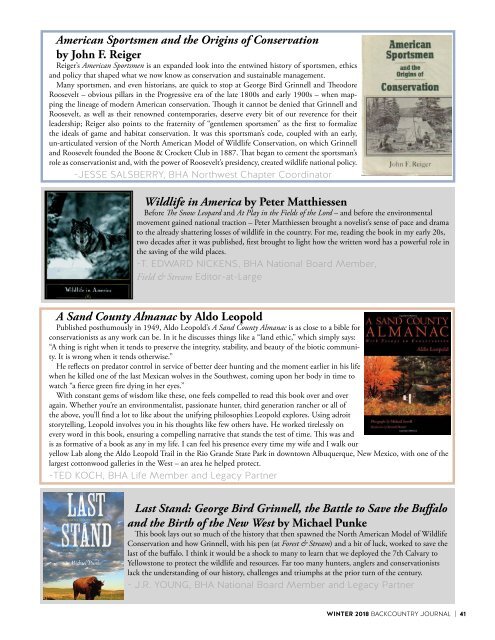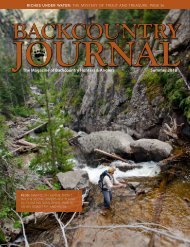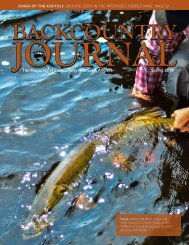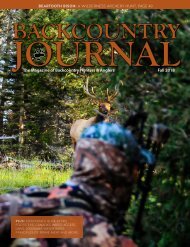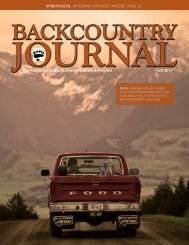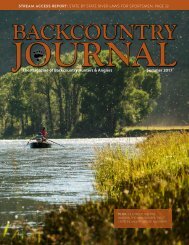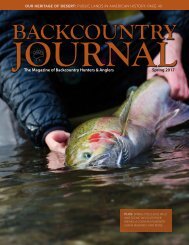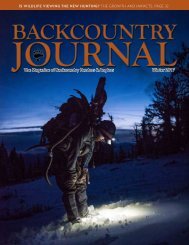BCJ_WINTER18 Digital Edition
Create successful ePaper yourself
Turn your PDF publications into a flip-book with our unique Google optimized e-Paper software.
American Sportsmen and the Origins of Conservation<br />
by John F. Reiger<br />
Reiger’s American Sportsmen is an expanded look into the entwined history of sportsmen, ethics<br />
and policy that shaped what we now know as conservation and sustainable management.<br />
Many sportsmen, and even historians, are quick to stop at George Bird Grinnell and Theodore<br />
Roosevelt – obvious pillars in the Progressive era of the late 1800s and early 1900s – when mapping<br />
the lineage of modern American conservation. Though it cannot be denied that Grinnell and<br />
Roosevelt, as well as their renowned contemporaries, deserve every bit of our reverence for their<br />
leadership; Reiger also points to the fraternity of “gentlemen sportsmen” as the first to formalize<br />
the ideals of game and habitat conservation. It was this sportsman’s code, coupled with an early,<br />
un-articulated version of the North American Model of Wildlife Conservation, on which Grinnell<br />
and Roosevelt founded the Boone & Crockett Club in 1887. That began to cement the sportsman’s<br />
role as conservationist and, with the power of Roosevelt’s presidency, created wildlife national policy.<br />
-JESSE SALSBERRY, BHA Northwest Chapter Coordinator<br />
Wildlife in America by Peter Matthiessen<br />
Before The Snow Leopard and At Play in the Fields of the Lord – and before the environmental<br />
movement gained national traction – Peter Matthiessen brought a novelist’s sense of pace and drama<br />
to the already shattering losses of wildlife in the country. For me, reading the book in my early 20s,<br />
two decades after it was published, first brought to light how the written word has a powerful role in<br />
the saving of the wild places.<br />
-T. EDWARD NICKENS, BHA National Board Member,<br />
Field & Stream Editor-at-Large<br />
A Sand County Almanac by Aldo Leopold<br />
Published posthumously in 1949, Aldo Leopold’s A Sand County Almanac is as close to a bible for<br />
conservationists as any work can be. In it he discusses things like a “land ethic,” which simply says:<br />
“A thing is right when it tends to preserve the integrity, stability, and beauty of the biotic community.<br />
It is wrong when it tends otherwise.”<br />
He reflects on predator control in service of better deer hunting and the moment earlier in his life<br />
when he killed one of the last Mexican wolves in the Southwest, coming upon her body in time to<br />
watch “a fierce green fire dying in her eyes.”<br />
With constant gems of wisdom like these, one feels compelled to read this book over and over<br />
again. Whether you’re an environmentalist, passionate hunter, third generation rancher or all of<br />
the above, you’ll find a lot to like about the unifying philosophies Leopold explores. Using adroit<br />
storytelling, Leopold involves you in his thoughts like few others have. He worked tirelessly on<br />
every word in this book, ensuring a compelling narrative that stands the test of time. This was and<br />
is as formative of a book as any in my life. I can feel his presence every time my wife and I walk our<br />
yellow Lab along the Aldo Leopold Trail in the Rio Grande State Park in downtown Albuquerque, New Mexico, with one of the<br />
largest cottonwood galleries in the West – an area he helped protect.<br />
-TED KOCH, BHA Life Member and Legacy Partner<br />
Last Stand: George Bird Grinnell, the Battle to Save the Buffalo<br />
and the Birth of the New West by Michael Punke<br />
This book lays out so much of the history that then spawned the North American Model of Wildlife<br />
Conservation and how Grinnell, with his pen (at Forest & Stream) and a bit of luck, worked to save the<br />
last of the buffalo. I think it would be a shock to many to learn that we deployed the 7th Calvary to<br />
Yellowstone to protect the wildlife and resources. Far too many hunters, anglers and conservationists<br />
lack the understanding of our history, challenges and triumphs at the prior turn of the century.<br />
- J.R. YOUNG, BHA National Board Member and Legacy Partner<br />
WINTER 2018 BACKCOUNTRY JOURNAL | 41


